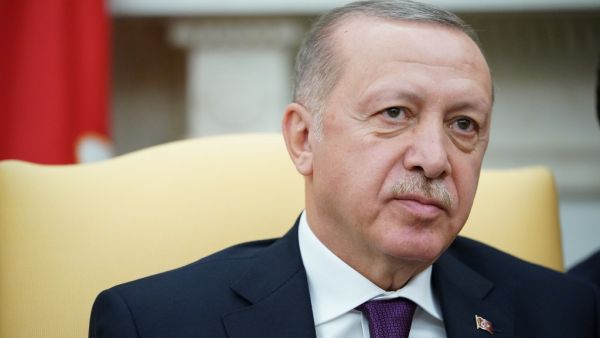Turkey has said it will deport an American Islamic State fighter stuck in a border buffer zone to the United States.
Turkish authorities made the announcement on Thursday after he was refused entry to Greece, leaving him stuck at the border between Greece and Turkey for days.
Turkish authorities said on Monday they had begun to repatriate Islamic State (IS) detainees to their home countries, deporting a German and an American, and a further 23 European nationals would be sent home in the coming days.
Earlier this week Turkish president Recep Tayyip Erdogan said the fighter, who is believed to be a US fighter of Jordanian descent, was 'not our problem', as Turkish television broadcast images of a man standing between the borders of the two countries, with his arms in the air.
According to AFP, he had refused to be returned to the US and instead asked to be sent to Greece.
Greek police said on Monday Turkish police had come to the Kastanies border post and requested that a US citizen of Arab descent accompanying them be let into Greece, as he had been arrested for exceeding his maximum permitted stay in Turkey.
{"preview_thumbnail":"https://cdn.flowplayer.com/6684a05f-6468-4ecd-87d5-a748773282a3/i/v-i-6…","video_id":"6945e324-6e1f-4ae2-b453-929fea92f778","player_id":"8ca46225-42a2-4245-9c20-7850ae937431","provider":"flowplayer","video":"UN Alarmed at Crackdown on Freedom of Expression in Egypt"}
The man was refused entry and returned to Turkey, Greek police said. However, Turkish state media said the man had remained in a buffer zone between Turkey and Greece.
Earlier this week, Turkish television broadcast images of a man who they claim is the IS fighter, standing between the borders of the two countries, with his arms in the air.
President Recep Tayyip Erdogan said that the man trapped in the no-man's land between the Turkish and Greek borders was 'not our problem'.
'We don't care whether or not he was trapped at the border,' Erdogan said in televised remarks. 'Whether or not they let him in is not our problem.'
A Turkish official said the man had refused to be returned to the United States and had asked to go to Greece.
It was not clear why Turkey thought Greece would accept a US citizen.
Jean-Charles Brisard, the president of the Centre for Analysis of Terrorism in Paris, said in a tweet that the video showed 'a Isis jihadist expelled by Turkey to Greece is literally stuck in the buffer zone separating the two countries after Greece's refusal to allow entry into the territory'.
On Thursday, the Interior Ministry said the United States had agreed to take back the fighter, who had requested deportation to Greece prior to being denied entry.
'Upon guarantees that he will be taken back by the United States and that travel documents will be procured, the necessary proceedings have been started to send him to the United States,' the ministry said in a statement.
Turkey, which has suffered multiple deadly attacks by IS militants, says it has captured 287 fighters in northeast Syria since launching a cross-border incursion on Oct. 9 targeting the Kurdish YPG militia.
Ankara says it is has hundreds more jihadists in detention, and has accused European countries of being loath to take back citizens who travelled to join Islamist militant factions fighting in Middle East wars, mainly in Syria and Iraq.
European NATO allies of Turkey have been worried that IS militants could escape Kurdish prisons in northern Syria as a result of the Turkish offensive.
Thousands of militants were jailed in YPG-controlled territory after the collapse of the IS 'caliphate' in 2017, and tens of thousands of their relatives are kept in camps there.
Ankara views the YPG, the main component of the U.S.-backed Syrian Democratic Forces (SDF), as a terrorist group that backs a Kurdish insurgency on Turkish soil.
Turkey's move to deport the American IS fighter came a day after President Tayyip Erdogan held talks with U.S. President Donald Trump in Washington to overcome mounting differences between the NATO allies.
Erdogan said he told Trump that Turkey expected the United States to halt its support for the YPG.
This week Erdogan announced Ankara would start sending foreign ISIS fighters back to their home countries following his country's invasion of northern Syria and attacks on the Kurds.
Erdogan, and even President Trump, have frequently criticised Europe for refusing to take back their ISIS fighters voluntarily.
This article has been adapted from its original source.








